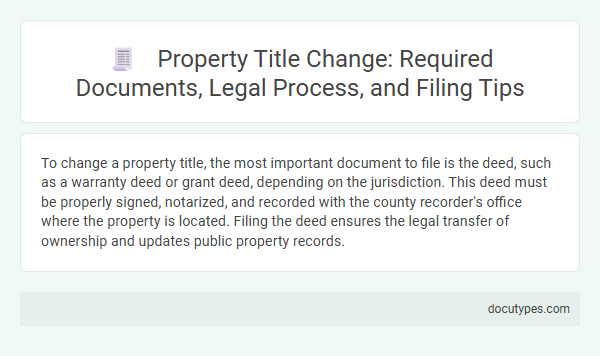To change a property title, the most important document to file is the deed, such as a warranty deed or grant deed, depending on the jurisdiction. This deed must be properly signed, notarized, and recorded with the county recorder's office where the property is located. Filing the deed ensures the legal transfer of ownership and updates public property records.
Understanding Property Title Change
Understanding property title change is essential when transferring ownership. This process legally updates the official record of who owns a specific property.
To initiate a property title change, a deed must be filed with the appropriate county or municipal office. Common documents include a warranty deed, quitclaim deed, or grant deed, depending on the transaction type. You must ensure the deed is properly signed, notarized, and recorded to complete the ownership transfer.
Key Reasons for Changing Property Titles
Changing a property title requires filing specific legal documents to ensure proper ownership transfer and public record updates. Understanding the key reasons for changing property titles helps identify the necessary paperwork and procedures involved.
- Deed Transfer - Filing a new deed, such as a warranty deed or quitclaim deed, officially transfers property ownership from one party to another.
- Inheritance or Estate Settlement - Probate filings or estate documents must be submitted to change the title after the property owner's death.
- Marriage or Divorce - Legal documents like a marital agreement or divorce decree are filed to update ownership rights in the property title.
Essential Documents for Property Title Transfer
To complete a property title change, the deed must be properly filed with the local county recorder's office. This document serves as the official record transferring ownership from the seller to the buyer.
Essential documents for property title transfer include the original deed, a completed title transfer form, and any required affidavits or disclosures. You may also need to submit proof of payment for applicable transfer taxes and recording fees to finalize the process.
Legal Requirements for Title Change
What document must be filed for a property title change? A deed is the primary legal document required to transfer ownership of real estate. The deed must be properly executed, notarized, and recorded with the county recorder's office to ensure the title change is legally recognized.
Step-by-Step Process of Property Title Change
| Step | Action | Required Document(s) | Description |
|---|---|---|---|
| 1 | Obtain the Original Title Deed | Current Property Title Deed | This document proves existing ownership and is essential for processing the title change. |
| 2 | Prepare the Deed of Transfer | Deed of Transfer Agreement | Legal document signed by the buyer and seller specifying the transfer of ownership rights. |
| 3 | Complete Property Transfer Tax Forms | Transfer Tax Declaration Form | Declaration form used to calculate and pay property transfer taxes applicable on the sale. |
| 4 | Submit Application to the Land Registry Office | Application for Title Transfer | The formal submission of all necessary documents to update ownership records. |
| 5 | Provide Proof of Payment for Taxes and Fees | Receipts for Transfer Tax, Registration Fee | Proof of payment is mandatory to validate and complete the title change process. |
| 6 | Verify Identification Documents | Government-issued IDs of Buyer and Seller | Identification verification ensures the authenticity of parties involved in the transaction. |
| 7 | Receive Updated Property Title Certificate | New Title Certificate | Official document confirming the ownership change in the land registry. |
Common Challenges in Title Transfer
Changing the title of a property requires filing specific legal documents with the appropriate government office. Understanding the common challenges in title transfer can help ensure a smooth process.
- Deed Submission - The new deed must be accurately completed and filed with the county recorder or land registry to officially update ownership.
- Title Search Issues - Unresolved liens or claims on the property can delay or complicate the title transfer process.
- Incorrect Documentation - Errors in the paperwork, such as misspelled names or incomplete forms, can result in rejected filings and further delays.
Filing Tips for a Smooth Title Change
To officially change the title of a property, specific documents must be filed with the local county recorder or land registry office. Understanding the required paperwork and filing process helps ensure a smooth title transfer without delays.
- Deed - The signed and notarized deed, such as a quitclaim or warranty deed, must be submitted to transfer property ownership.
- Completed Transfer Forms - Accurate transfer forms required by the county or state must accompany the deed for processing.
- Payment of Fees - Applicable recording fees or transfer taxes must be paid at the time of filing to avoid rejection.
Your careful preparation and submission of the correct documents streamline the property title change and protect ownership rights.
Role of Notaries and Witnesses in Title Transfers
When transferring property title, the deed or title document must be filed with the local land registry or relevant government office to officially record the change of ownership. Notaries play a crucial role in verifying the authenticity of signatures on the deed, ensuring the transaction complies with legal requirements. Witnesses are often required to attest to the signing process, providing additional validation and preventing potential disputes over the title transfer.
Costs and Fees Involved in Property Title Changes
Filing a property title change requires submitting a deed, such as a warranty deed or quitclaim deed, to the local county recorder's office. This document legally transfers ownership and must be accurately completed to avoid delays.
Costs involved in property title changes include recording fees, which vary by county but typically range from $25 to $100. Additional expenses may include transfer taxes, title search fees, and costs for legal or notary services.
What Document Must Be Filed for Property Title Change? Infographic

